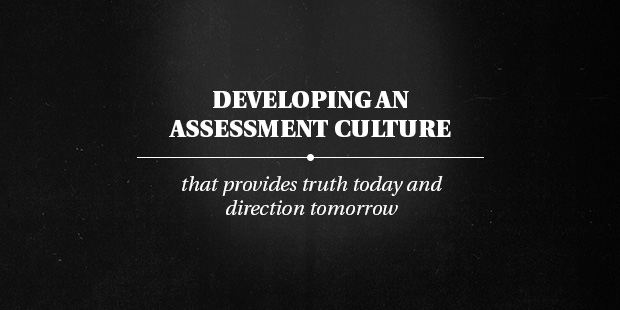
Developing an Assessment Culture that Provides Truth Today and Direction Tomorrow
I hate bad stats. They undermine the credibility of Christians and can confuse the issues. (I’ve written on the issue in Christianity Today.) But when we apply stats wisely, they can be of great benefit.
So while I often say “facts are our friends,” they aren’t always friendly. For example, in 2009, LifeWay Research found that 55% of church attendees believed they had grown spiritually over the last year, while only 3.5% of those displayed any measurable growth. That’s not a very warm and fuzzy stat, but it’s an honest one.
Sometimes, though, churches tend to be more hopeful than honest when they look at their situation. That can be good—we are a people of faith. However, bad information undermines good strategy. I believe that churches must have the right information to make that right decisions.
That takes intellegent self assessment.
When we speak of the need for an assessment culture, we want churches and Christians to avoid making claims that are unsubstantiated. We, above all others, need to be trustworthy, and we can do that with accurate assessment of where we are as individuals and a church.
Churches need honesty as much as they need to have hope.
Assessments are a great way to examine the truth about today and provide a direction for tomorrow. And an assessment culture within a church provides a way forward in thinking about where we are and how to go forward in making disciples.
For so long, churches have claimed success because their focus was on bodies, budgets, and buildings. Other areas, where the picture was not as pretty, were ignored. Creating a true assessment culture is about changing the scorecard. Attention is given to the factors that really lead to biblical growth and transformation within a church across cultural contexts and regardless of the size.
In Transformational Church, Thom Rainer and I examine the research to determine and explain the factors that were common to those churches across the spectrum who were experiencing true transformation. It’s why we developed our Transformational Church Assessment Tool. Instead of targeting areas that had been traditional measuring sticks for discipleship, we evaluated a broad spectrum of churches that were seeing transformation take place. They made disciples. By investigating what was taking place there, we proposed a new scorecard to assess the actual health of a church.
I’m not concerned so much that you use our LifeWay Research assessment tools—though I believe in it because the methods are verified statistically and repeatable in any church setting—I just want you to be engaged in assessing your ministry and doing so in a way that gives you an accurate portrayal of your success or lack thereof.
An assessment culture helps you take a realistic look at what your priority areas should be and evaluate how you are making progress in those. Too often we allow ourselves to slip into a false comfort from anecdotal progress that is not really indicative of what is happening.
I want your church to be transformational, and I know you do as well. We need churches that are being transformed by their dynamic relationship with Christ and, as a result, transforming their members and their surrounding neighborhood. Establishing an assessment culture can help you find and address the areas where you are not seeing that occur as well and as often as it could.
Later in this series on creating an assessment culture, I will be talking about why it is you need it, what are some wrong ways to do it, and two of the factors that must be a part of any church assessment culture.
While “creating an assessment culture” may not sound like the most intriguing topic, I believe it is vital to the health of your church. It enables and empowers you to not just think you are making disciples on a consistent basis, but to know that your church is regularly fulfilling the Great Commission.
Part One of a four-part series. Read part Two here.
Read more from Ed here.

Tags: Assessment, Ed Stetzer, Transformation, assessment culture













